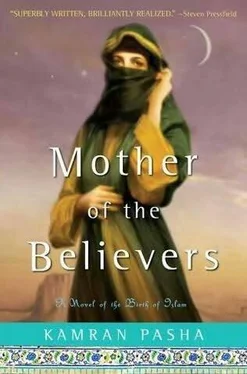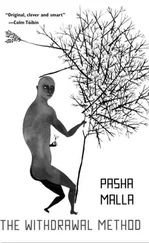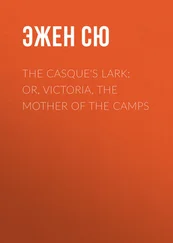“Aisha, show me where the words are,” he said.
I felt every eye in the tent on me and for once I was glad that my face was hidden behind a black veil. I did not want the Companions to see the wicked smile on my face as I walked past Ali and leaned over the Prophet’s shoulder. I stared down at the page and saw where Ali had written my husband’s name and his title as Messenger of God. And then I pointed my forefinger at the simple swirls of the Arabic alphabet, indicating to the Prophet where the troublesome language lay.
The Messenger took the pen from Ali’s hands and without any hesitation crossed out his sacred designation. My task fulfilled, I stepped back, but my eyes locked with Ali’s, and I savored my tiny victory over the man who had sought my downfall.
Muhammad handed the pen back to Ali, who bit his lip and wrote over the deleted honorific “the son of Abdallah”…
A SHORT WHILE LATER, the treaty was signed and Suhayl departed to take the news of the Prophet’s capitulation to his masters in Mecca. I saw the sullen and disappointed faces of the Companions, but none had the courage to press the matter further with my husband.
None except Umar.
The Prophet sensed Umar’s eyes on him and he turned to face the father of Hafsa, the man who had once been considered the most stalwart of his followers. My husband raised his eyebrows and stood patiently, waiting for Umar to explode.
But when the giant of a man spoke, it was not with outrage but with deep confusion and mistrust.
“Are you truly the Messenger of God?” he said softly, a question that was shocking in its implications. I heard several Companions gasp loudly. Had Umar lost his faith? Had the great defender of Islam become an apostate?
Whatever thoughts may have run through his mind, the Prophet merely raised his head with dignity.
“I am” was all he said. All he needed to say.
“Your promised us victory!” The fight had seeped out of Umar and his usually deep and raging voice was now more like the whine of a disappointed child.
The Prophet stepped forward and put a gentle hand on Umar’s forearm.
“And I have delivered it you,” he said confidently. “This treaty will be the greatest victory of Islam.”
Umar’s shoulders fell, as did his voice, which was now almost a whisper.
“But you said that God promised us we would conduct the rites of Pilgrimage…” he croaked out.
The Prophet turned to my father, and Abu Bakr spoke loudly, as if he intended his words to be heard by all the secret doubters in the tent, not just by Umar.
“God did not promise us that it would be this year,” Abu Bakr said, and I saw people lower their heads in shame as his soothing voice put out the last fires of rebellion in their hearts.
As my father’s words sank into his heart, Umar knelt down at the feet of the Messenger and kissed his right hand, tears streaming from his face.
“Forgive me, O Messenger of God,” he said, his voice trembling with grief.
My husband took Umar’s hand and helped him rise to his feet.
“You are forgiven, my friend,” he said warmly. “Come, let us spread the good news to the pilgrims. The war is over. Peace has come to Arabia at last.”
At these words, I saw the sad looks evaporate, replaced by beaming faces and mouths opened wide in laughter. I suddenly felt a rush of joy as the truth of it came home to me at long last. We had made a treaty with the Meccans. A peace treaty that would end a war that now spanned almost two decades. There would be no more horrific battles, no more agonizing cries of mothers as they looked down upon the corpses of their sons. There would be no more Hamzas struck down in the prime of their lives, their bodies mutilated and dishonored. No more Talhas to lose the use of their hands and be forced to live like cripples, the cruel repayment for heroism in this world. My heart soared at the thought that the ten-year truce could become permanent and that Arabia would never be cursed with the misery of bloodshed again.
But I was wrong, and I would soon learn that the peace we embraced that night, like the gentle caress of the Divine Sakina, was a fleeting moment to be savored but could no more be held in one’s grasp than the fickle kiss of the wind.
Word had reached the Jewish fortress at Khayber of Muhammad’s peace treaty with the Meccans, and Huyayy had raged and cursed for days about the betrayal of the Quraysh. The Arabs were two-faced dogs, he had ranted, and they had abandoned their promises to their allies in the hopes of securing some temporary security against the expanding influence of Medina.
Safiya had tried to calm him, but her father had refused to listen. The Treaty of Hudaybiyya was the proof that Huyayy had been seeking of the treachery of his erstwhile Meccan allies. Ever since the failure of the Siege of the Trench, Huyayy had become obsessed with speculation that Abu Sufyan had betrayed him and made a secret agreement with the Muslims to withdraw, leaving his Jewish compatriots of the Bani Qurayza to face annihilation. She knew that the guilt he felt about the destruction of the last remaining Jewish tribe of Medina weighed heavily on her father’s heart, and the only way that he could bear the pain was to find someone besides himself to blame for the tragedy.
Though few among her people shared in Huyayy’s increasingly elaborate conspiracy theories, there was no denying that the treaty between Muhammad and his pagan enemies had forever altered the balance of power in the peninsula. And the new reality did not favor the people of Khaybar, the last remaining Jewish settlement in Arabia. Without the support of the Meccans, the tiny enclave was isolated and exceedingly vulnerable to conquest by the ambitious Arab prophet.
And so it was that the elders of Khaybar opened their ears to the words of the Byzantine envoy. Donatus had arrived earlier that morning at Khaybar with a small contingent of Syrian guards bearing the seal of Heraclius, Emperor of Constantinople. Even though Heraclius was no friend of the Jews, Safiya’s father had convinced the elders of the settlement to offer him a dignified welcome, for they shared a common enemy.
Safiya eyed the Byzantine emissary with a mixture of curiosity and contempt. He was dressed in the flowing dalmatic of the Romans, the long-sleeved robe partially covering his brightly striped tunic and tight breeches. A blue Phrygian cap covered his flowing brown hair and bracelets of gold glittered on his wrists. All in all, Donatus looked more like a primped and pretty girl than a man of power, and his authority was based on aristocratic blood rather than achievement. She had no patience for such weak men, especially after her father had compelled her to marry Kinana, a prissy nobleman of Khaybar whose touch she found repellent.
Safiya listened intently as Donatus explained how the Byzantine emperor had become aware of the new power rising on his southern borders. Apparently Muhammad had himself reached out to the imperial court with a letter inviting the Romans to surrender to his God. News of this startling development set the council room ablaze with excited talk until Huyayy called for silence so that Donatus could give more details.
According to Byzantine intelligence agents, the Arab prophet had similarly written to the Persian emperor Khusro at Ctesiphon, who had been so stunned at the audacity of this illiterate Arab chieftain that he had the letter torn up.
Though the Persians had laughingly dismissed the idea that the newly rising power in Arabia was of any concern to them, the Byzantines had been sufficiently alarmed by the speed of Muhammad’s consolidation of the tribes to decide that it merited a response. Heraclius had instructed his generals to begin preparations for a preemptive invasion of the peninsula before its ambitious prophet-king became a problem for the empire’s lucrative trade routes. And the Byzantines wanted the help of the people of Khaybar in mounting their attack.
Читать дальше












